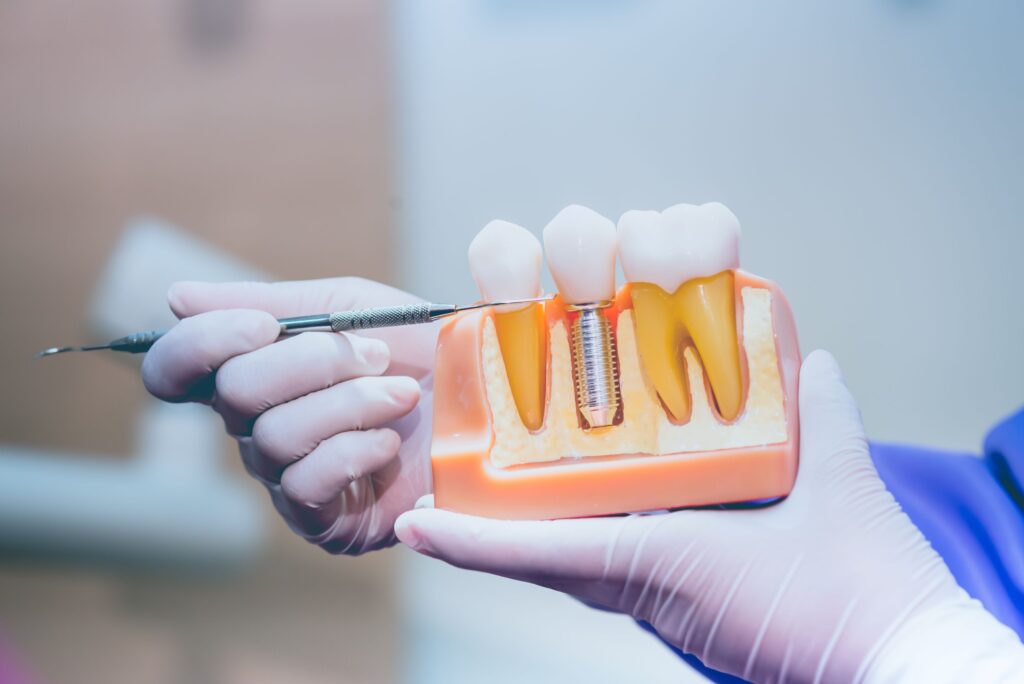
Many experts consider dental implants the ideal way to replace missing teeth because of their many unique advantages. Unlike dentures and dental bridges, they contain a support rod that’s surgically embedded into your jaw, so it functions more like a natural tooth.
This also makes them more reliable and resilient than the alternatives. However, many patients want to know long they last before committing to treatment. Continue reading to learn more about what dental implants are made from and how these materials can impact their lifespan!
What Are Dental Implants Usually Made From?
Dental implants are comprised of three main parts: the support pole that’s surgically embedded into your jawbone, the abutment connector piece, and the tooth-colored restoration customized to match your natural teeth for seamless results.
The rod placed in your jaw is made from durable, biocompatible material so your body doesn’t reject it. Typically, titanium is used because it’s known for being lightweight, so it doesn’t feel heavy, but is incredibly strong and can withstand the pressure of daily biting and chewing. However, it can also be made from zirconia, an incredibly resilient ceramic.
The abutment piece can also be made from titanium or zirconia, and the tooth-shaped cap is made from customized porcelain or resin designed to match your smile perfectly in terms of shape, size, and color.
How Do Dental Implant Materials Impact Longevity?
Your new tooth offers several distinct advantages over dentures and dental bridges, as it fuses with your jawbone to function as a sturdy, standalone structure. It’s only natural to want to maintain your restored smile for as long as possible, and the materials it’s made from can impact its lifespan.
Dental implants made of titanium have been available to patients since the 1960s, and numerous studies and analyses have provided important information about what you can expect from your results. For instance, it’s been established that titanium implants can remain in place for 20 years or longer if cared for correctly.
Zirconia is another popular choice, particularly for individuals with titanium allergies. This ceramic material can also fuse with your jawbone for a more permanent replacement tooth; however, because this option is newer, there’s less information available about its lifespan. Initial research suggests that this type of tooth may last 10 to 15 years or more with proper maintenance.
How Can I Preserve My Dental Implants?
Regardless of the materials used, it’s essential to clean your mouth consistently to prevent oral issues with your new teeth. Your dental implants cannot develop decay, but the leading cause of failure is a pervasive form of gum disease called peri-implantitis. It can thankfully be prevented by brushing and flossing twice daily and visiting your dentist every six months for a routine checkup and cleaning.
If you’re still unsure how long your recent restoration is expected to last, your dentist can provide information that takes your unique circumstances into account.
About the Practice
At Arts Family Dentistry of Dallas, you benefit from two dentists dedicated to helping families in Dallas build and maintain happy, healthy smiles. Dr. Azimi and Dr. Patel collaborate to provide a comprehensive menu of services to meet all your needs, including dental implants. They partner with local experts to ensure accurate placement, then utilize state-of-the-art technology to design and place a comfortable, lifelike restoration to close the space in your smile. If you need to replace missing teeth, you can request an appointment on the website or by calling (469) 981-1700.




